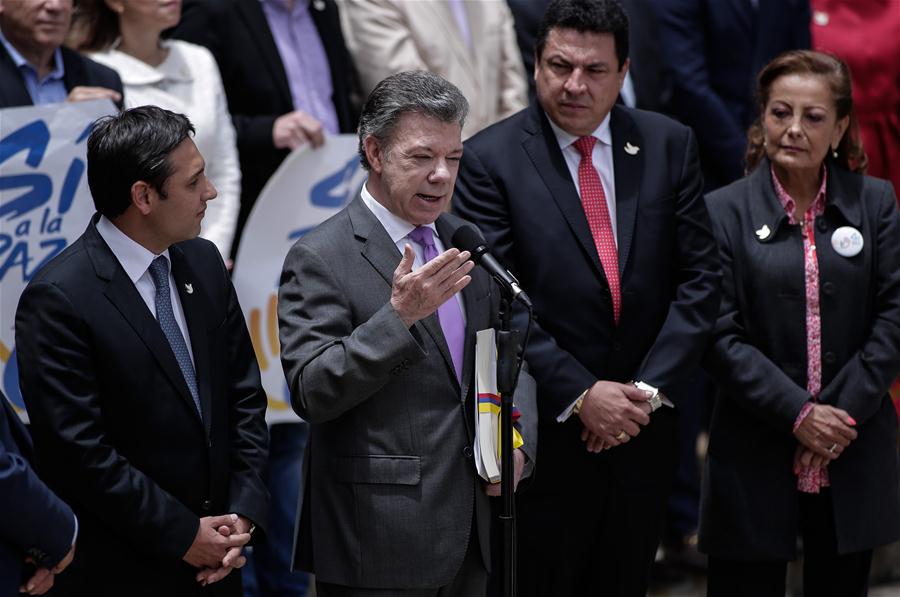
Colombian President Juan Manuel Santos (2nd L) speaks at a ceremony during which he delivers the peace agreement with the Revolutionary Armed Forces of Colombia (FARC) to the congress in Bogota, Columbia, Aug. 25, 2016. The Colombian government and the FARC announced late Wednesday that they have reached a final peace agreement to end a half-century of civil war. (Xinhua/Jhon Paz)
BOGOTA, Aug. 25 (Xinhua) -- As Colombians celebrate the most important moments in the country's history after a peace agreement was reached between the government and the FARC guerrillas on Wednesday, the future of Colombia now rests in the millions across the country.
On Oct. 2, the country will vote in a plebiscite on whether to accept or reject the agreement after four years of talks. To many, it might seem obvious that acceptance would win by a large margin after 52 years of war in the Andean country.
However, the actions taken by the Revolutionary Armed Forces of Colombia (FARC), the killings and kidnappings carried out by their fighters, still stick in the throats of many.
Making the importance of this vote clear, President Juan Manuel Santos announced that the full text of the agreement would be made available broadly by the media, on government websites and on social networks on Thursday.
A Gallup poll released on Aug. 16 showed that 67.5 percent of Colombians would vote in favor of the peace deal, with 32.5 percent opposing it.
However, nothing is being taken for granted. While millions of Colombians celebrated the deal and have stated they will vote "Yes" in most polls, the "No" camp has been gaining ground in recent weeks, led by former president and current senator Alvaro Uribe.
Uribe, who still enjoys great support in the country, has been vocal in claiming that the deal is of huge benefit to the FARC but not so favorable to members of the armed forces.
Senator Cecilia Lopez from the Liberal Party is optimistic about the vote. "Many people are awaiting to become familiar with the totality of the agreement. We will get to know it and then people will understand that these agreements mean the end of the FARC, which is a blessing for Colombia," she told Xinhua.
She cautioned that "any country at war is a divided country, the war leaves a lot of pain. The FARC is an organization that causes a lot of resentment in our society. For 52 years, they committed human rights violations, kidnapping, extortion, forced recruitment. The feeling (toward them) is understandable."
"But I feel there will be an important majority in favor of ending this war once and for all and implementing this peace agreement," concluded Lopez.
One of the major points of the agreement is that the FARC will be able to become a political party, once it has fully disarmed.
For Uribe, this is giving away too much. Contrary to Santos, he says a "No" vote would mean the end of the peace process. It would pressure the FARC leaders to reach a better deal, which does not provide impunity to its members and would force those guilty of crimes to face lengthy jail terms. Uribe also objects to those guilty of crimes against humanity being allowed to enter democratic politics.
The agreement, as explained by Santos, allows guerrilla fighters who come forward and confess to avoid jail sentences and be remanded under house arrest. Those who do not confess yet are found guilty in court face jail terms of up to 20 years.
Experts believe that a "Yes" vote would see Colombia enter a post-conflict phase, lasting about a decade, during which it would have to slowly and peacefully resolve differences.
One of the major factors of this phase would be the search for those who disappeared during the conflict and reparations to victims and their families. Thousands of Colombians have never known the fate of their loved ones, despite many searches.
A special unit will be formed to search for bodies and return remains to their families, while a dedicated tribunal will work out the logistics of amnesty and reparations.
Janeth Bautista has searched for 19 years for news of her family, through peaceful protests.
"This is a long awaited moment for the families of the missing as it charts a path to find them and to return to our homes. My sister, Nidia Erika, was (made) disappeared by the army in 1987 as well as my husband, two days later. Until now, this case has seen total impunity. I hope the Truth Commission...will help to reconcile us and bring justice," she told Xinhua, during celebrations in Bogota.
"We, the families of the missing, say 'Yes' to peace because we still believe in justice. We want to leave our children and grandchildren a different country from the one we have lived in," she said.
According to the Center of Resources for Conflict Analysis (CERAC), since the FARC declared a unilateral ceasefire on July 20, 2015, the deaths of civilians killed in clashes between the rebels and the army have dropped by 75 percent.
The conflict in Colombia has killed more than 220,000 people and displaced millions since 1964.



